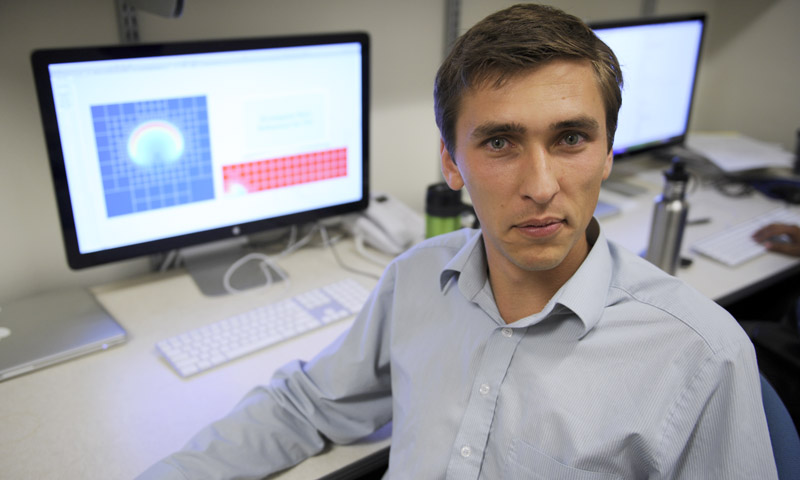Research has long been a cornerstone of the Naval Postgraduate School (NPS) mission – it is a simple, straightforward requirement at any graduate level university. At NPS, students and faculty from across departments apply their expertise to solving real-world defense challenges, but are joined in their efforts by roughly two dozen top young scientists from around the world and across disciplines.
These bright young minds come to NPS via the National Research Council (NRC) Research Associateship Program, and are selected to join various departments across campus providing invaluable support to diverse research efforts.
NPS Vice President and Dean of Research, Dr. Jeffrey Paduan, has seen firsthand the value that postdoctoral fellows can bring to a department. In his 21 years with the NPS oceanography department, Paduan has seen that the postdoc relationship can be a mutually beneficial one.
"The NRC program is a truly win-win proposition,” Paduan explained. “For the fellow, the program provides access to some of the government's most cutting-edge laboratory groups. For the sponsoring laboratory, including NPS, the program handles all of the application, review, and matching activities needed to identify the most promising fellows."
The program provides postdoctoral fellows a unique opportunity to apply their experience in the lab, working on research that could potentially directly reach the defense community. As valuable as the experience is for the students, the faculty also see the postdocs as a valuable asset for their departments, and NPS as a whole.
“Unlike most research universities, in which the graduate student population contains a large fraction of Ph.D. students, NPS is mostly focused on master programs,” explained Oceanography Associate Professor Dr. Timour Radko. “This creates a significant void in terms of technical and specialized projects, a void that NRC postdocs help to fill. In addition to the critical support they provide to faculty members, NRC postdocs help to create the synergy and environment much needed for the professional development of graduate students. The presence of young ambitious scientists enriches and invigorates the department as a whole.“
Radko serves as an advisor for postdoctoral fellow Jason Flanagan, who is continuing his doctoral research in ocean ring stability. Flanagan previously attended the University of Limerick, Ireland, where he received his Ph.D. in Applied Mathematics and Statistics.
Flanagan is just one of several fellows serving in the oceanography department, a part of campus that has hosted numerous postdocs over the years, but his unique research helps generate interest and discussion around a topic that the maritime community has a growing interest in.

NPS Postdoctoral Fellow Michal Kopera serves in the applied mathematics department, after receiving his Ph.D. in Engineering from the University of Warwick, U.K. His research explores adaptive mesh refinement techniques for non-hydrostatic unified models of the atmosphere.
“To date, research has been focused on developing a theoretical framework to explain the interaction of small-scale, large-scale, mesoscale and basin-scale ocean processes,” explained Flanagan. “One motivation for this research is the desire to better understand, predict and potentially utilize processes that affect naval operations. For instance, mesoscale activity plays a role in the determination of undersea warfare activity whilst surface signatures may be enhanced or diminished by small/large scale processes. Both recently completed and ongoing numerical simulations have provided validation of theory and insight into previously little-understood phenomena.
“Conducting research here at NPS has provided invaluable experience on several complementing fronts,” he continued. “Given the nature of the student populace, a high level of professionalism, enthusiasm and motivation exists which is invigorating and sustaining. Additionally, the opportunity to work alongside vastly experienced faculty members who are internationally-recognized researchers has been both humbling and inspiring for a researcher at the early stages of career development.”
Like Flanagan, NRC Fellow Michal Kopera of the applied mathematics department traveled halfway around the world to pursue his NRC fellowship. Kopera received his Ph.D. in Engineering from the University of Warwick, U.K., and has been at NPS for 10 months. His research explores adaptive mesh refinement techniques for non-hydrostatic unified models of the atmosphere. His work can be applied to weather forecast models for the Navy and the National Oceanic and Atmospheric Administration.
“Working in the Department of Applied Mathematics is a great experience, which allows me on one hand to continue working with methods I learned during my Ph.D., and on the other, it exposes me to a whole world of new concepts in high-order numerical methods,” Kopera noted. “I feel that my work can contribute to the research goals of the department, NPS and Navy in general.”
Kopera’s advisor, Applied Mathematics Professor Frank Giraldo, echoed that sentiment, noting that in addition to enriching their own experiences through applied research, the postdocs offer a unique resource for students studying at NPS.
“The value that NRC postdocs bring to the departments is that they form the ‘corporate memory’ that tends to be lacking at NPS,” said Giraldo. “For example, in my group, the postdocs may be on campus anywhere from two to three years and so they are able to disseminate the knowledge that they acquire to the Ph.D. and master's students. The value of this ‘corporate memory’ cannot be overstated as this is extremely important in the educational process of an institution.
“Also, it is a very effective way to introduce and train future researchers to the sorts of problems that are of importance to the DOD,” he added. “They develop an expertise and interest in these areas which they can pursue for years to come.”

